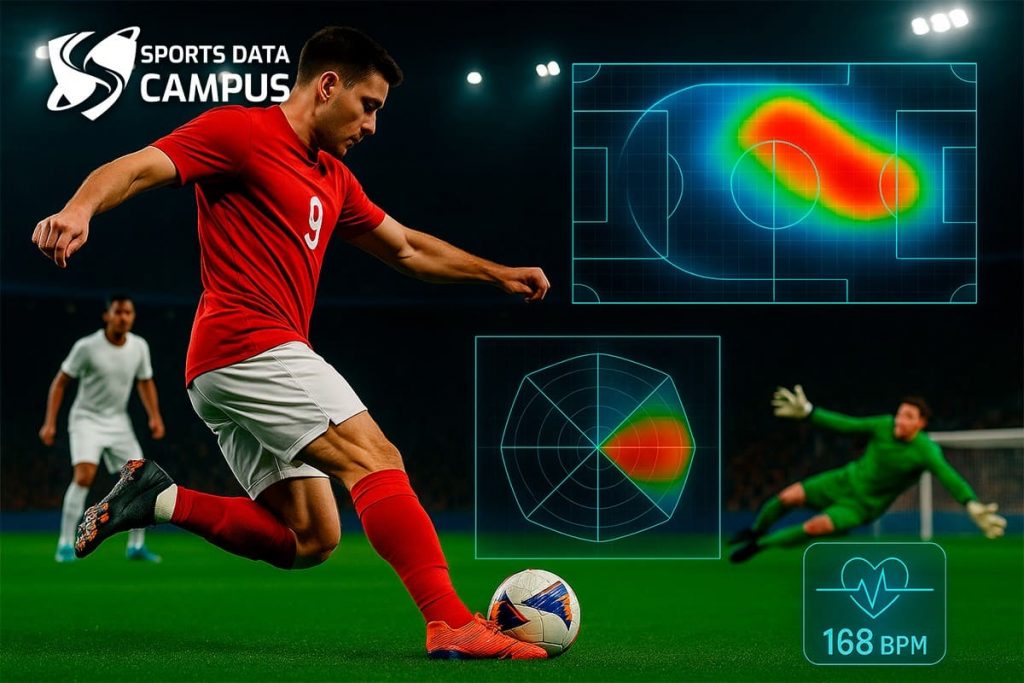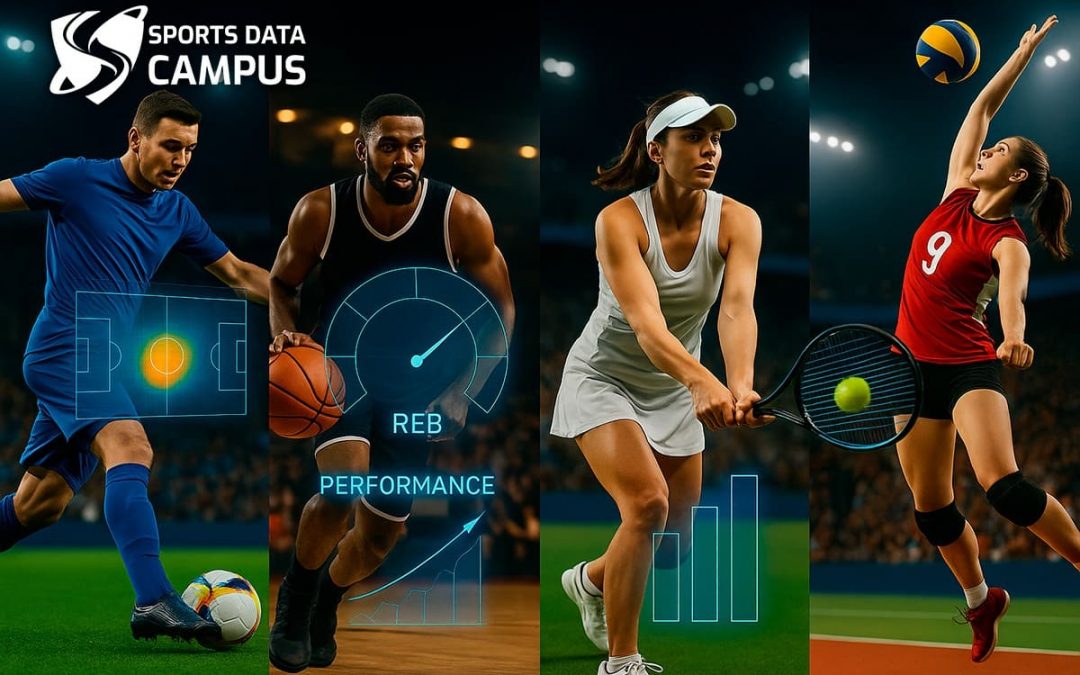The growing integration of Artificial Intelligence in football and other sports fields has made a significant impact — from enhancing tactical analysis and players’ physical performance to introducing cutting-edge technology that sharpens decision-making during matches. With uses ranging from spotting patterns of play to injury prevention and fully personalised training, AI is actively reshaping the sporting world and helping teams and athletes push their limits like never before.
For quite some time now — and in many different ways — AI has been gradually taking hold. We’re not just talking about automated or assisted intelligence, but also autonomous and augmented systems. Thanks to computer vision technology, it’s now possible to track every action in a match for every player in great detail, making it easier to uncover behavioural patterns. For example, it allows for accurate assessments of things like a player’s passing effectiveness and precision, highlights potential roles based on their actions (not just their position on the pitch), and even calculates high-level metrics such as scoring probability while factoring in the full match context.
The role of Artificial Intelligence in football – how it’s used today
These different forms of AI are already being used in a range of areas — from estimating values in GPS tracking systems to compensate for data loss, to ball tracking via cameras, image and video analysis for data extraction and advanced metrics, and even thermal imaging to assess muscle fatigue.
Artificial Intelligence is democratising decision-making in sport — you could say it’s levelling the playing field by making data analysis accessible to everyone. Bringing this tool into the game has made sport far more inclusive, allowing teams and athletes at all levels to analyse performance, anticipate trends and tweak tactics in a much more efficient and accurate way.
It’s entirely possible that, at some point, systems will be able to analyse and even quantify things like a player’s instinct, a team’s chemistry, or the psychological impact they might have on their opponents
Artificial Intelligence has also become a key ally in protecting athletes’ health. While professional sports teams already rely on medical and physical specialists to look after their players, AI can be used in a predictive way — helping to prevent injuries, avoid overtraining, and manage workload more effectively. It’s a powerful tool when it comes to modulating and tailoring training, but it must always be applied in a personalised way to offer accurate, reliable recommendations for each individual.
Looking ahead, and assuming any changes are grounded in solid ethical and fair principles, we might see sport’s rules and governance evolve as AI becomes more widespread. This could mean integrating AI technology to support — or even replace — referees in certain sports, or using AI-backed analysis to guide decisions in areas like recruitment and squad management.
The social impact AI is having through sport is a hugely important factor. It’s helping to drive inclusion in the sporting world — for example, by enabling people with disabilities to take part through the use of AI-powered prosthetics and exoskeletons.
At the same time, there are still areas to explore — especially where the subjective and objective sides of sport meet. One day, we might well see systems capable of analysing and quantifying things like a player’s instinct, a team’s dynamics, or even the psychological effect they have on their opponents.
How Artificial Intelligence is boosting analysis in sport
The adoption of Artificial Intelligence in sport is helping teams, coaches, and athletes fine-tune their strategic decisions by bringing together machine learning algorithms and complex data analysis.
But AI isn’t just changing what happens on the pitch — it’s also transforming the fan experience. From personalised stats and content to simulations of key moments and deep-dive match analysis tailored to individual interests, fans are getting closer to the game than ever. Its impact goes even further, from sensor-based training systems to match analysis using neural networks, covering virtually every aspect of sport.
Next, we take a look at how Artificial Intelligence is optimising athlete performance, improving strategic decision-making, driving the development of new talent, and reshaping the fan experience.
Optimising athletic performance
Artificial Intelligence is making it easier to design fully personalised training programmes by analysing real-time biometric data — such as fatigue levels, physical effort and overall strain — to optimise performance and help prevent injuries through smart workload adjustments. Sensors, wearables and specialised software monitor variables like speed, endurance, heart rate, movement patterns and force, constantly adapting training loads to maximise results while minimising the risk of overexertion. This allows coaches and fitness staff to create far more efficient programmes tailored to each athlete’s individual needs.
Take a footballer wearing a tracking device during training, for example. They can get real-time feedback on their fatigue levels and adjust their effort on the spot. Based on that data, the coach can immediately tweak the workload to ensure the player isn’t overdoing it — keeping them on track to improve performance without compromising their health.
Top-level teams — in football, basketball, athletics and beyond — are using AI to predict injury risk. These systems process vast amounts of historical data, including biomechanics, physical stress and previous injuries, to spot patterns and flag up early warnings. By identifying potential overloads or anomalies, AI helps prevent problems before they surface. This allows staff to fine-tune training intensity, rest periods and recovery routines with precision, offering smarter long-term health and performance management.

Strategic analysis and decision-making
In the world of Artificial Intelligence and sport, data analysis has become a key tool for boosting team performance and refining strategy. Sports teams now collect detailed information on both their own players and their opponents — tracking physical and tactical metrics and using data mining techniques to uncover patterns that offer a competitive edge during matches.
In football, for instance, AI-powered tools track players’ movements across the pitch and analyse previous plays to spot potential gaps in the opponent’s defence. This allows the coach to receive real-time recommendations for tactical changes — before the rival team can exploit a weakness. It means teams can anticipate moves and adjust on the fly to boost their chances of success.
In sports like football and basketball, AI doesn’t just interpret live tactics — it also suggests strategic changes based on precise statistics. For example, in a basketball match, the system might detect that an opposing player is fatigued or missing shots from a particular range. With that insight, the coach can adjust the team’s approach to take advantage, recommending specific plays or defensive tweaks. In this way, AI delivers crucial data that helps coaches make smarter calls, optimise each play, and improve the odds of winning.
Artificial Intelligence is transforming the world of sport, opening up new opportunities and challenges across the industry. For those looking to stay ahead of the curve in this fast-moving revolution, the Master’s in Artificial Intelligence Applied to Sport, developed in collaboration with Olocip, is the perfect choice
Talent identification and development
AI in sport doesn’t just enhance the performance of current players — it also plays a vital role in spotting future stars. AI-powered platforms process video analysis of young athletes, evaluating their technical, tactical and biomechanical skills, and comparing them to elite-level players using pattern recognition techniques. This allows AI to detect each player’s growth potential, suggest areas for improvement and even forecast long-term success. Scouts and coaches can then focus their efforts on the athletes with the greatest promise — often before they’ve fully developed.
In football, for example, an AI platform might analyse a young striker’s technical ability and compare their playing style to that of professionals like Lionel Messi or Cristiano Ronaldo. Based on that comparison, the system can break down elements such as speed, passing accuracy, dribbling skill and decision-making — offering tailored feedback to help the player reach their full potential.
Clubs and academies are also using AI to track the progress of players in development. This enables them to design customised training plans that match each player’s evolving needs. In basketball, for instance, AI can study a young player’s shooting technique and compare it to top professionals — recommending specific tweaks in shooting angle or applied force. By doing so, AI helps shape young athletes from an early age, ensuring they get the right support to grow and succeed in the long run.
Fan engagement and experience
Artificial Intelligence has redefined the way fans experience sport, offering advanced personalisation through recommendation algorithms that tailor audiovisual content to each individual’s preferences. Mobile apps and digital platforms now use AI to serve up personalised content based on each fan’s interests. For example, fans can receive instant replays of key moments or in-depth match analysis tailored to their favourite players or teams. If someone follows a particular player closely, the AI delivers custom highlights, stats and performance breakdowns for that player in every game.
In football, for instance, AI can detect the most exciting moments in a match — goals, assists, top saves — and automatically show replays based on what the viewer cares most about. It gives fans direct, personalised access to the moments they truly enjoy, without needing to scrub through long match recaps or generic videos.
The combination of Artificial Intelligence and augmented reality is taking this even further, creating immersive experiences for fans. Some stadiums now offer interactive tech that lets spectators access live stats, match data and detailed analysis through smart screens or wearable devices. AI-powered virtual assistants can even respond to fans’ questions during the match — from time remaining and team line-ups to live win probabilities — creating a more dynamic and enriching connection with the game. All of this takes the sporting experience to a new level, giving fans a much more active, personalised and connected role in the action.
The role of AI in sport
From cutting-edge stadiums to AI research labs, sport is undergoing a quiet but powerful revolution. Esteban Granero — former footballer and now CEO of Olocip — joins us to explore how AI is transforming athletic performance through scientific, rigorous methods. We delve into the use of predictive models in key areas like performance, scouting and injury prevention, and discover what it really means to apply causal Artificial Intelligence to decision-making at the elite level.
It’s a journey into the future, where innovation, data and opportunity come together to rewrite the rules of the game. Don’t miss this conversation with one of the leading voices in sports technology.
Artificial Intelligence is transforming the sports industry, creating new opportunities and challenges along the way. For those looking to stay at the forefront of this revolution, the Master’s in Artificial Intelligence Applied to Sport, developed in collaboration with Olocip, is the ideal choice. This comprehensive programme covers everything from large-scale data analysis to the implementation of predictive algorithms — all focused on the sporting sector. By the end, you’ll be equipped to enhance athlete performance, improve tactical decision-making, and harness the latest technologies in elite sport.
The Master’s in Artificial Intelligence Applied to Sport delivers advanced training in cutting-edge technologies aimed at optimising athletic performance, refining tactical decisions and supporting the development of new talent — opening doors in a sports industry that’s increasingly demanding highly skilled professionals.
Fill in the form and get full details about the Master’s in Artificial Intelligence Applied to Sport


